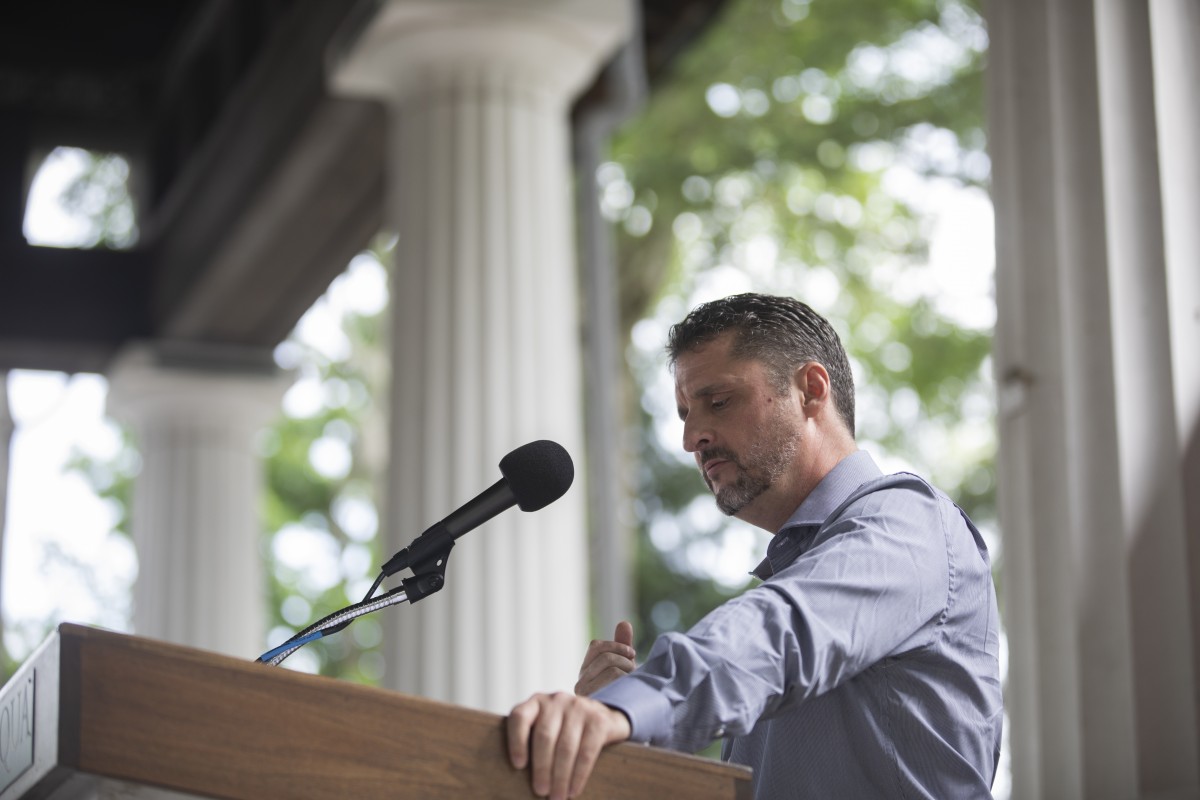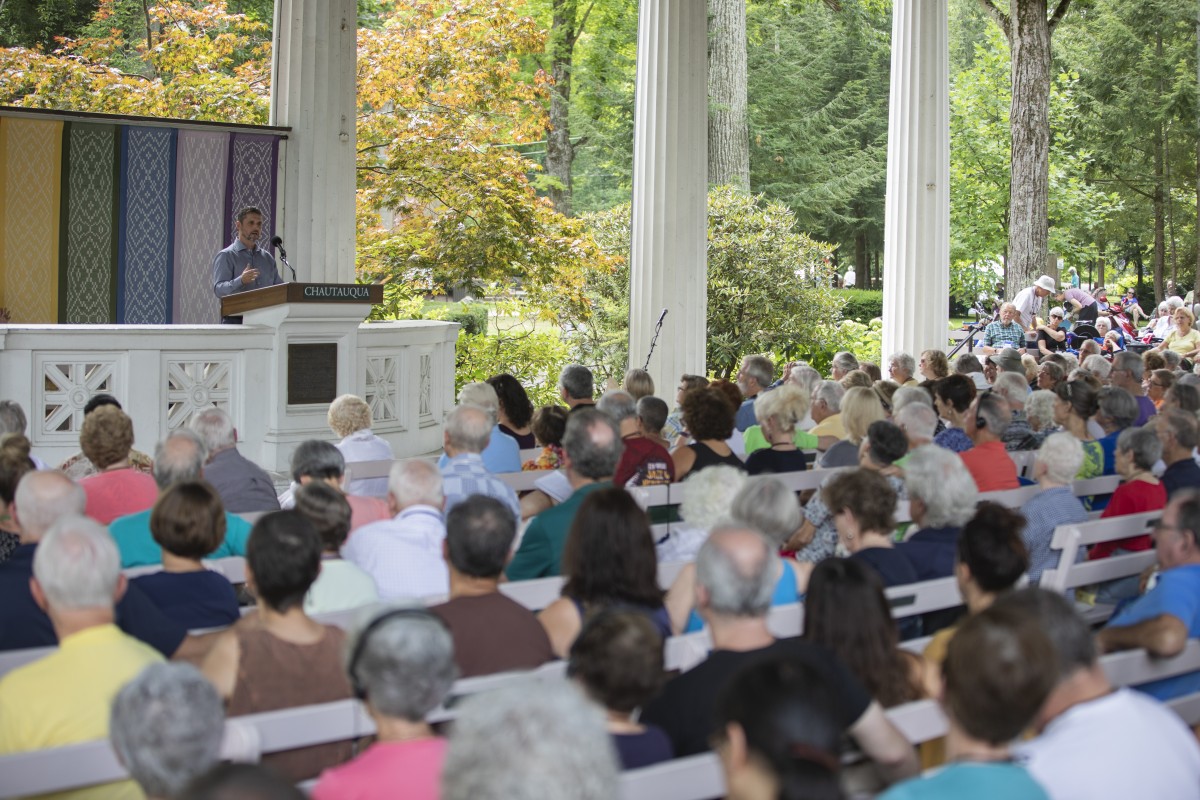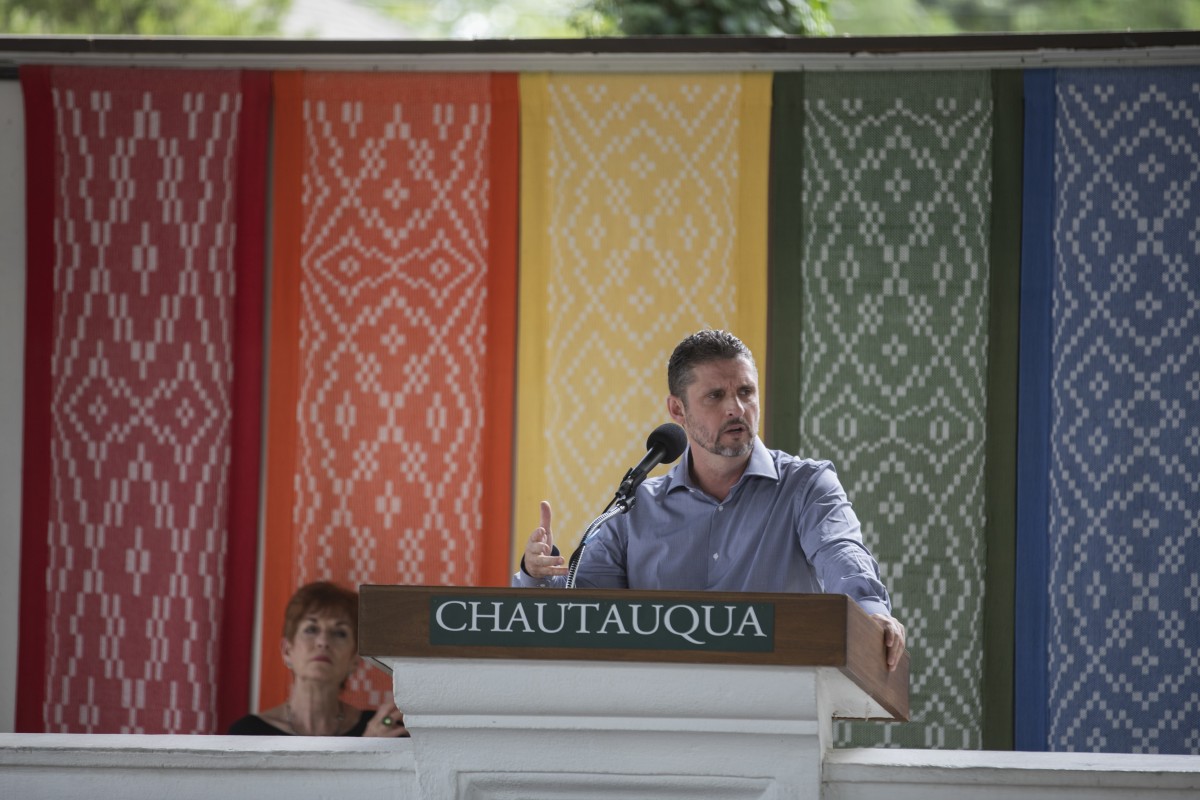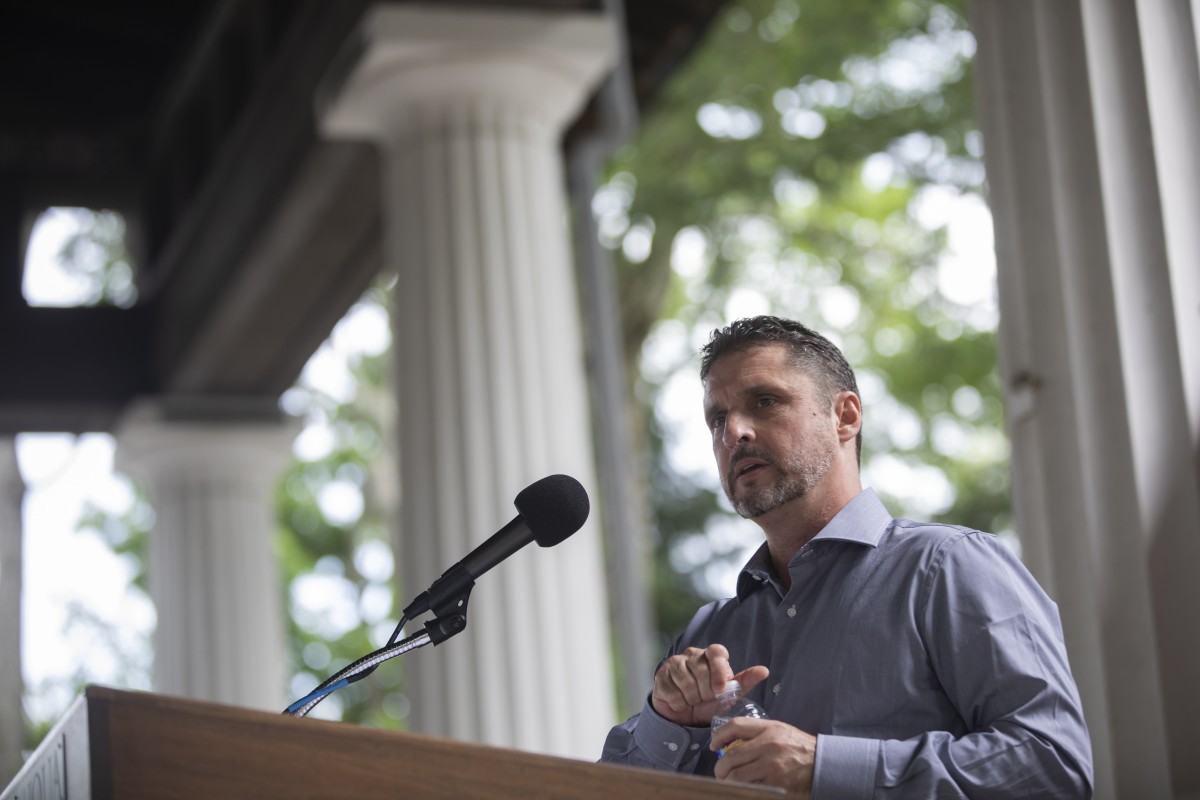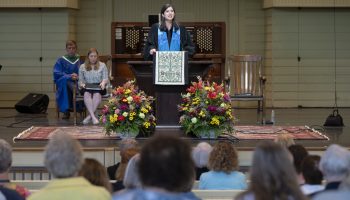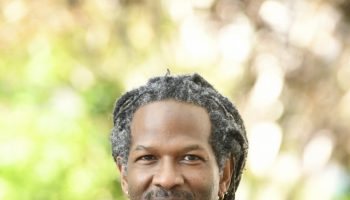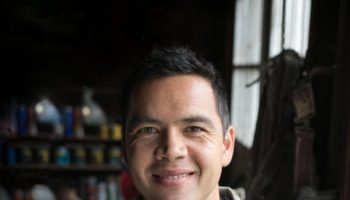A half-century ago, a bullet robbed Martin Luther King Jr. of his life and a nation of his leadership. According to Drew Dellinger, Americans are still facing many of the same challenges King’s civil rights movement stared down, challenges that represent a failure to understand the world’s interconnectedness.
At 2 p.m. Thursday, Aug. 16, in the Hall of Philosophy, Dellinger, a poet and founder of Planetize the Movement, a progressive movement dedicated to encouraging the intersection of justice, ecology, cosmology and art, gave his lecture, “All Life is Interrelated: The Interconnected Vision of Martin Luther King Jr.,” to conclude Week Eight’s interfaith theme, “Not to be Forgotten: A Rememberance on Dr. Martin Luther King Jr.”
“Even as he focused on racism, war and poverty, King’s understanding of existence as interconnected was central to his vision and his work for peace and for racial and economic justice.”
-Drew Dellinger, Founder, Planetize the Movement
The inability to understand King’s view of interconnectedness stems from modern Americans misremembering him, Dellinger said.
“We misremember him in education, in the media and in popular culture by failing to engage with the deeper dimensions of his work and the radical nature of his vision,” he said.
Dellinger called King the “omnipresent figure” in global culture. The Massachusetts Institute of Technology Media Lab conducted a survey that placed King first on its list of “globally known people” born in the United States. In 2006, The Atlantic ranked King eighth on its list of the 100 most influential figures in American history.
Even though he believes the global recognition of King is justified, Dellinger still doesn’t believe it is for the right reasons, as people fail to understand the entirety of his vision.
“Despite the annual holiday in his honor with its obligatory clips from his ‘I Have a Dream’ speech, we have allowed our focus on the surface of King’s image to obscure the deeper dimensions of his thought,” he said.
In addition to King’s representation in the media, Dellinger said his vision is misremembered in educational settings as well.
“His most radical critiques have often been obscured in the effort to present a crowd-pleasing, noncontroversial (King) in classrooms,” he said. “These abridged editions of his mission have succeeded in softening our memory of King’s prophetic fire, blending his legacy into a cardboard cut-out.”
Scholar Derrick P. Alridge demonstrated with his survey of textbooks, curricula, and teaching on King in high school classrooms, that the history taught to youth tends “to gloss over King’s critiques of American racism, poverty and the war in Vietnam,” and presents “narrow, sanitized views.”
“Our children need the real Dr. King; they don’t need narrow, sanitized views,” Dellinger said.
Dellinger said misremembering King has led to a “superficial” version of him. According to Dellinger, King’s colleague, the Rev. Jesse Jackson, captured society’s perception of King “perfectly.”
Dellinger quoted Jackson: “We think of Dr. King like he was a big civil rights teddy bear, but this guy was radical.”
Dellinger was first introduced to the concept of a “superficial King” when he read Vincent Harding’s Martin Luther King: The Inconvenient Hero — more specifically, an essay in the book called “Beyond Amnesia.”
“He says we basically have amnesia in regards to the fullness of Dr. King’s teachings because we freeze him on the steps of the Lincoln Memorial in 1963 giving the ‘I Have a Dream’ speech, and we almost completely ignore the last five years of his life,” Dellinger said.
Dellinger said Harding’s interpretation inspired him to learn more about King’s work in the last years of his life. However, Dellinger noted King was radical his entire life.
“He was critiquing capitalism in the 1950s, so I don’t think there was a dramatic shift, but I do think that as the ’60s were carrying on and as the rhetoric was becoming more radicalized, King was also making these connections between racism, war and poverty,” he said.
Dellinger refers to the last two years and two months of King’s life as the “mountaintop period,” the most radical and forgotten years.
The “mountaintop period” started when King moved to Chicago.
“To me, that is the beginning of this period in which King is linking the issues and making connections,” he said.
As an example, on Jan. 14, 1968, King made a radical statement when he stopped to speak to anti-Vietnam War protesters.
“He told them, ‘I see these two struggles as one struggle,’ ” Dellinger said. “So King was making these links from racism and white supremacy to the war in the Vietnam, he was linking the international and the domestic, he was linking the civil rights movement to issues of poverty and economic inequality.”
While King was making connections between various world issues, Dellinger said he was always focused on the significance of systemic racism and challenging white supremacy in America.
“In his last years, he made some of his most searing indictments of systemic racism and the philosophy and practice of white supremacy,” Dellinger said. “In just the last few weeks of his life, he said, ‘The first thing that must be on the agenda of our nation is to get rid of racism.’ ”
More specifically, King said later on in Mississippi that the thing “wrong with America is white racism.”
“I love that quote because it is so simple and uncompromising,” Dellinger said.
Dellinger said in order to reclaim the radical King in present day, people need to recognize the depth of his critiques on white supremacy.
“He has been softened as kind of a paragon of racial reconciliation, and that’s why we quote from the latter part of the ‘I Have a Dream’ speech of little black boys and little black girls holding hands with little white boys and little white girls,” he said. “We less often hear the earlier parts where he says, ‘There will be neither rest nor tranquility in America until the Negro is granted his citizenship rights.’ ”
Beyond reclaiming King’s radical aspects, there are also ecological and cosmological dimensions of King’s thought, Dellinger said.
Dellinger quoted an example of King’s ecological standpoints from a television interview in July 1967: “It would be foolhardy for me to work for integrated schools or integrated lunch counters and not be concerned about the survival of the world in which to be integrated. … Our cities are gasping in polluted air and enduring contaminated water.”
“We now would recognize that as an early environmental justice statement,” Dellinger said.
King was also involved in the “atomic” or “nuclear” issue.
“He said, ‘We played havoc with the destiny of the world,’ ” Dellinger said. “ ‘Somewhere we must make it clear that we are concerned about the survival of the world.’ Elsewhere he wrote, ‘It is very nice to drink milk at an un-segregated lunch counter, but not when there’s Strontium 90 in it.’ ”
As part of the ecological King, there is also a cosmological King, Dellinger said.
“From the beginning of his leadership, King used language that was not only theological, but consistently cosmological,” he said. “King said that in the summer of 1956, ‘We have the strange feeling down in Montgomery that in our struggle for justice, we have cosmic companionship.’ ”
Dellinger then quoted King three months later, addressing a meeting at Holt Street Baptist Church.
“These 11 months have not at all been easy,” King said. “ … Our feet have often been tired and our automobiles worn, but we have kept going with the faith that in our struggle we have cosmic companionship, and that, at bottom, the universe is on the side of justice.”
King was also interested in the physical cosmos, Dellinger said.
He quoted King from a sermon he delivered called “Our God is Able.”
“He revels in what he calls ‘the vast scope of the cosmic order,’ and King said, ‘Since I started talking to you about five minutes ago, you and our earth have hurtled through space more than 5,500 miles,’ ” Dellinger said. “King pointed out that the earth is circling the sun so fast that even the fastest jet would be left 66,000 miles (behind) in the first hour of the race.”
King continued to learn about the cosmos from his favorite television show, “Star Trek.” One day, he met with African-American actress Nichelle Nichols, who played Lt. Uhura. King did not know at the time, but Nichols was planning on leaving the show to pursue a career on Broadway.
“When he found out he said ‘You can’t leave. Do you understand?’ ” Dellinger said. “ ‘It has been heavenly ordained, this is God’s gift and onus for you. You have changed the face of television forever because this is not a black role, this is not a female role. Anyone could fill that role. This is a unique role, at a unique point in time that breathes the life of what we are marching for: equality.’ ”
That meeting drove Nichols to stay on the show after he convinced her of the importance of her role, the power of television, the significance of science fiction and of her presence in the show’s portrayal of the 23rd century.
Whether it was through his sermons or an episode of “Star Trek,” Dellinger said King also had an understanding of unity and connectedness that was linked to action.
“Dr. King predicted the ‘inevitable decay of any system based on principles that are not in harmony with the moral laws of the universe,’ ” Dellinger said. “King’s cosmology told him that somehow the universe is on the side of all that is moving toward justice, dignity, goodwill and respect.”
Dellinger believes King’s interconnected worldview, a vision that “centers justice and peace and bold action” for social change, is the vision present-day America needs in order to survive.
“King’s interrelated vision bridging ecology and social justice is more relevant than ever in our time of climate crisis, ecological devastation, economic injustice, the #MeToo movement and the movement for black lives,” Dellinger said. “It is precisely the kind of vision we need today if humanity is to have a viable future.”


